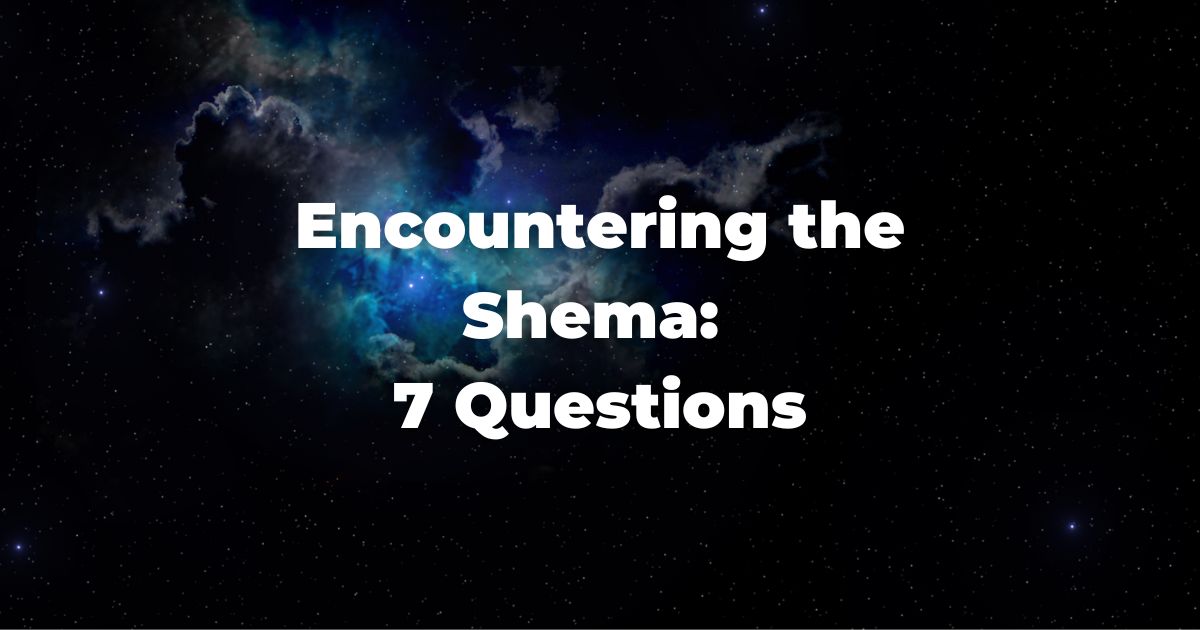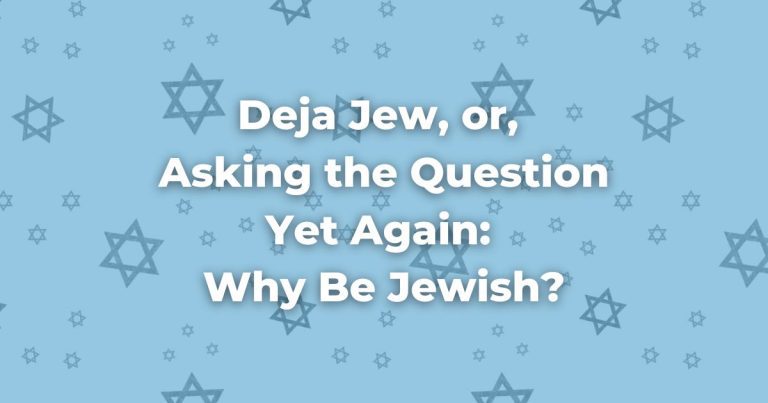If there’s one teaching of Judaism with which every Jew is familiar, it would have to be the “Shema.”
Many are aware of its importance; as the basic principle of Jewish belief – Belief in (only) One God.”
It may be the very first Hebrew sentence we learned as a child.
It may be the only phrase in Hebrew that we are able to recite.
It may be the only phrase in Hebrew that we feel we can translate.
It may be the last sentence on our lips when we leave this life.
Throughout my life, I’ve tried to understand what this sentence really means. Translated, it becomes,
“Hear/listen/pay attention Israel, the Lord our God, the Lord is One (Sole/Unique/Indivisible).”
But this is only the beginning of attempting to understand what we are being told here.
- Who are we actually addressing by “Israel?”
- What do we mean by the word we translate as “Lord?”
- What do we mean by the word we translate as “our God?”
- What’s the difference between “Lord” and “God?”
- Why do we say “our God,” and not simply use the expression “the Lord is God?”
- What are we saying we when we claim God “Sole/Unique of Indivisible?”
- Wouldn’t it have meant the same thing if the verse had simply stated, “Hear, O Israel, the Lord is One?”
By attempting to answer the first six questions, we may arrive at the answer to our seventh question when we encounter the Shema.
1. Who are we actually addressing by “Israel?”
Our verse is found in the TorahRefers to the first five books of the Hebrew Bible, the Tanakh, also called the Five Books of Moses, Pentateuch or the Hebrew equivalent, Humash. This is also called the Written Torah. The term may also refer to teachings that expound on Jewish tradition. Read more, in the book of Deuteronomy 6:4. This book comprises a series of three speeches that Moses, our great teacher, gives to the Israelites about a month before his departure from the world.
In this context, “Israel” could be understood as his referring to the assembled Israelites and a way of emphasizing the importance of this statement. However, the value of the Torah, as sacred literature, goes beyond its literal context.
The purpose of preserving these words was to provide a powerful message to future generations. In this context, “Israel” would refer to all Israel (i.e. the “Jewish People”) regarding future generations.
I remember a teacher suggesting that since “Israel” is a general way of referring to a person of Jewish extraction, we might substitute our own names for “Israel.” In this way, we would use this phrase as a meditation to ourselves; helping us focus on what follows. (For example, in my case, I would be saying to myself, “Hear/pay attention, Mordecai, the Lord our God, the Lord is One.”)
2. What do we mean by the word we translate as “Lord?”
The word used in the Torah is the Tetragrammaton. (The Hebrew letters, Yud – Hei – Vav – Hei). As young children learning Hebrew we are taught that, out of deep respect, we don’t actually pronounce these letters as they are written. Instead, we pronounce them as “A-do-nai.”1
In analyzing the letters that make up this term for the God, we see that they can form the words “hayah,” “hoveh,” and “yihyeh,” meaning “was,” “is,” and “will be.” In other words, “Eternal being!” One who exists beyond the scope of time and is the Ultimate Cause of everything else that exists.
(eg. If we are capable, as humans, of thinking, what we term as God would be the cause of our thinking. This applies equally to every aspect of existence, from distant galaxies to the depths of the ocean, to every single creature and to our own bodily functions!)
The belief in such a “transcendent” Existent One arises from our own sense of wonder at the glory, variety and complexity of the Universe in which we live.
While there may be many who might chose to deny the existence of this dimension of reality, there others who do sense and believe in this aspect of our existence. Believing that there is a Sole, Unique, Indivisible Transcendent Existent One is the basis of believing in A-DO-NAI.
3. What do we mean by the word we translate as “our God?”
4. What’s the difference between “Lord” and “God?”
5. Why do we say “our God,” and not simply use the expression “the Lord is God?”
These questions are actually all connected.
The basic meaning of the word “Elohim” that we translate as “God,” is “judge.” So when we say “A-do-nai E-lo-hei-nu,” we’re actually declaring that we accept A-do-nai as our judge.
In other words, we accept God as the one who is the sole and ultimate arbiter of our fate as human beings. It automatically means that we accept upon ourselves that we are individually – and collectively as members of the Jewish people – accountable to the One who is the Source of all Existence. That’s why we use the term “our” in referring to “E-lo-him.”
As Children of Israel, we recognize that while many others may believe in One God, that doesn’t necessarily mean they accept the relationship that was initiated by Abraham and Sarah.
Belief in a Divine Creator is one thing; Accepting Divine Authority is another. That is exactly where the mitzvot play an essential role.
Again, accepting Divine Authority in general is one thing; accepting Divine Authority by performing specific acts; in other words, performing Divine Commandments takes the concept of this loyalty to a completely different level.
So declaring the words “A-do-nai E-lo-hei-nu” is actually a pledge of loyalty to accept upon ourselves the performance of the mitzvot! This clearly implies finding out what those mitzvot are, and devoting ourselves to understanding how we would put them into practice – a task of a lifetime.
6. What are we saying we when we claim God “Sole/Unique of Indivisible?”
I believe this deals with the setting of our priorities. (To what degree do we consider God’s will in the decisions we make?)
In other words, “considering God’s will,” is taking into consideration our own relationship to the world in which we find ourselves. It takes us past our own self-interest and quite possibly to a place where we can find deep satisfaction with the role we play through the opportunities life presents us.
It also speaks to trust in “Something” far greater than ourselves.
Essentially by declaring what we have up to this point and stating our recognition that there is only One, Ultimate Source of our being and the very existence of the Universe, we can work towards the belief and practice that that Source that created us and this complex, amazing world is the Source of Kindness.
To quote our patriarch, Abraham, “Shall the Judge of all the earth, not perform justice?” Or a verse often quoted in the Psalms, “Acknowledge how good A-do-nai is, for His kindness endures forever!” We can decide how we wish to interpret the events of our lives and find ways to learn and develop – if we choose to believe.
Returning to question 1, above: More recently, I’ve come across one more interpretation of these six words, also based on a traditional interpretation of “Yisra’el.”
Our patriarch, Jacob’s, name was changed to “Israel.” The suggested interpretation of “Shema Yisra’el” is “Hear, O Jacob (Israel)! A-do-nai is our E-lo-him, A-do-nai the One.”
In other words we are declaring, over the millennia, that we remain loyal to the God of our ancestors both in our belief and in our practice – despite the long course of our checkered history and that “God” is One and the Same; our relationship to that God is one and the same and that the entire world is somehow linked together as the expression of God’s creative power.
The Shema, indeed, is a declaration of our Faith throughout history of our relationship to our ancestors and our God.
So…
7. Wouldn’t it have meant the same thing if the verse had simply stated, “Hear, O Israel, the Lord is One?”
I will let you answer that question!
1 Actually, we even go a step beyond this in showing respect for the Divine. We are only supposed to use these terms to denote God in prayer. Instead of “Ado-nai,” we substitute the term “Adoshem,” or simply “HaShem” (= “the Name”), and instead of “Elo-him,” we use the term “Elokim.” This principle is expanded to other names used for God. Our ancient rabbis introduced the term “HaKadosh Baruch Hu,” meaning “The Holy One, blessed be He,” to refer to God in common parlance.
Author
-

Rabbi Mordecai Miller developed a love of Torah learning from a young age, and it has lasted a lifetime. He has studied the TaNaCH (the Hebrew Bible) through a variety of lenses from Biblical comics to Biblical commentators, midrashimThis word is used in two ways, as both a concept and a literature. As a concept, midrash is the expansive interpretation of biblical texts. The term is used to describe the practice of rabbinic interpretation. As a text, it refers to specific collections of interpretations, particularly from the third to ninth centuries in the Land of Israel and Babylonia. Plural: Midrashim
View all posts https://www.bethamisr.org
Read more, and other Rabbinic sources. He finds the Bible and its associated works a source of ever-evolving inspiration - a spiritual light to illumine our paths.
Since ordination in 1974, Rabbi Miller has served congregations in St. Paul MN, Canton OH, St. Louis MO, and is currently serving at Congregation Beth Ami in Santa Rosa CA. Rabbi Miller is the son of Rabbi Meyer Miller and Israeli artist Shulamith Wittenberg Miller. He and his wife Susan are the proud parents of two Jewish professionals, their daughter Morat Derech Sarah Miller, and their son Rabbi Micah Miller, as well as two beautiful grandchildren. Rabbi Miller teaches a daily online class on the weekly Torah portion which can be accessed on YouTube.




